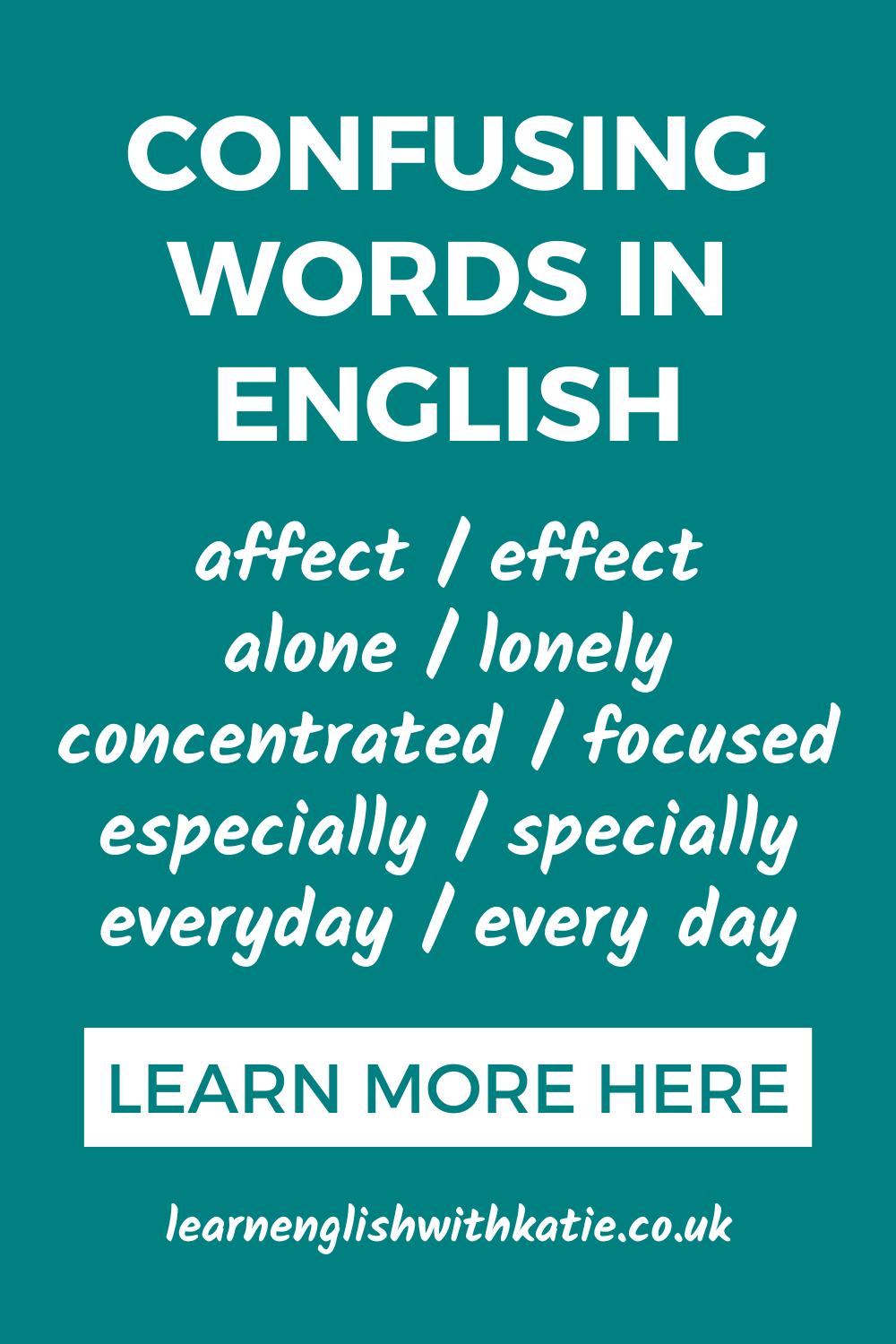|
Some of my most popular posts on my Facebook page recently have been about pairs of confusing words so I thought I would share some of these with you here. If you’d like to learn more, go to my Facebook page, find “search” in the menu and look for “confusing words”. AFFECT and EFFECT This is one even I have problems with! I know that one is a verb and one is a noun but I have to think carefully about which one is which! I’ve just found a great mnemonic (memory trick) on various websites: RAVEN Remember, Affect is a Verb and Effect is a Noun. Affect (verb) = to influence or cause a change The weather affects my mood. Everyone was affected by the COVID-19 pandemic. I didn’t know how much the decision would affect my life. Effect (noun) = the result of a particular influence The weather has an effect on my mood. I can feel the effects of my morning coffee wearing off! What are the long-term effects of sitting in front of a computer every day? (Just to confuse things, “effect” can be a verb but then it has a different meaning. It’s a formal word and it isn’t used much in conversation. It means “to make something happen”. It is not easy to effect real change.) ALONE and LONELY Alone = there’s nobody else This is usually a neutral word, describing a fact and not a feeling. Some people prefer living alone. Have you ever gone on holiday alone? The children stayed with their grandparents so Mum and Dad could have some time alone together. (This last example shows that “alone” doesn’t always mean one person.) But “feel alone” does describe a negative emotion. She felt so alone after her husband died. Lonely = unhappy because you have nobody to talk to You might feel lonely when you are alone or you might actually like being alone. Also, you can feel lonely even when you are surrounded by people that you don’t know. She felt very lonely after moving to the big city. Social media can actually make us feel more lonely sometimes. CONCENTRATED and FOCUSED As a verb, “concentrate” and “focus” usually have the same meaning. Concentrate/focus = to give all your attention to what you are doing (These words do have other meanings as well but I don’t want to mention them here. You can find these other meanings in a dictionary if you’re interested.) You can use either verb without changing the meaning of a sentence: He concentrated/focused on his homework. (past) He is concentrating/focusing on his homework. (now) As an adjective, “concentrated” usually has a different meaning. Concentrated = a liquid which has been made stronger by having some of the water removed This drink is made from concentrated orange juice. Focused = giving all your attention to one thing He is focused on his homework. There’s another meaning of “concentrated” which is similar to “focused”. Concentrated = making a lot of effort to achieve a goal He’s making a concentrated effort to improve his spelling. The most important thing is that you CAN’T say “he is concentrated”. You can’t use “concentrated” to describe a person. You can have concentrated orange juice, concentrated laundry detergent, a concentrated effort or a concentrated campaign, but not a concentrated person. ESPECIALLY and SPECIALLY Especially = very, more than usually, exceptionally The food was especially good. It was especially windy yesterday. Especially = particularly, above all, more than the others The food was really good, especially the desserts. She likes animals, but she especially loves cats. Specially = in a particular way, for a particular purpose The police use specially trained dogs to find drugs. She has to wear specially made shoes. I don’t want to be treated specially. I specially requested the vegetarian option. If you stick to these differences, you will always be right but there are sentences where both words are OK, especially in British English: Specially/Especially = for a special reason I made this (e)specially for you. The music was written (e)specially for this concert. They drove all this way (e)specially to visit me! EVERY DAY and EVERYDAY "Every day" = each day (Monday, Tuesday, Wednesday etc) or all the time. It’s an adverbial phrase and usually goes at the end of a sentence, or sometimes at the beginning. I go for a walk every day. Every day, I get up at 7am and go to bed at 11pm. Your English is getting better every day! "Everyday" = ordinary, typical or usual It’s an adjective and usually goes before a noun. These shoes are not for everyday use. They are only for special occasions. Problems are just part of everyday life. Traffic jams are an everyday occurrence. I hope you found this helpful! If there are two words which you find confusing, you can put a question in the comments. If you like posts like this, you might also be interested in my "Common Mistakes" e-book. This PDF download contains 90 of the most common mistakes made by English learners. There are exercises for you to try, answers to the exercises and explanations for each of the mistakes. Click the button below to get your copy:
0 Comments
Your comment will be posted after it is approved.
Leave a Reply. |
About the blogFollow the blog for mini lessons and tips on how to improve your English. Categories
All
Archives
July 2024
|

 RSS Feed
RSS Feed
